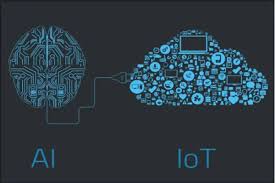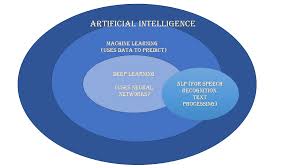Exploring Artificial Intelligence Solutions: Transforming the Future
Artificial Intelligence (AI) is no longer a futuristic concept but a present-day reality that is reshaping industries across the globe. From enhancing business operations to revolutionising customer experiences, AI solutions are at the forefront of technological advancement.
The Rise of AI Solutions
AI solutions have gained significant traction in recent years, driven by advancements in machine learning, data processing power, and algorithm development. These solutions are designed to mimic human intelligence, enabling machines to perform tasks such as decision-making, problem-solving, and language understanding.
Applications Across Industries
The versatility of AI solutions means they can be applied across various sectors:
- Healthcare: AI is used for predictive analytics in patient care, personalised medicine, and robotic surgery assistance.
- Finance: Banks and financial institutions leverage AI for fraud detection, risk management, and automated trading.
- Retail: Personalised shopping experiences and inventory management are enhanced through AI-driven insights.
- Manufacturing: Predictive maintenance and quality control processes benefit from AI’s ability to analyse large datasets efficiently.
The Benefits of Implementing AI Solutions
The integration of AI into business processes offers numerous advantages:
- Increased Efficiency: Automation of routine tasks allows human resources to focus on more strategic initiatives.
- Enhanced Decision-Making: AI provides valuable insights through data analysis, leading to informed decision-making.
- Cost Reduction: Reducing manual labour costs and minimising errors contribute to overall cost savings.
- Improved Customer Experience: Personalised interactions driven by AI enhance customer satisfaction and loyalty.
The Challenges Ahead
Despite its potential, implementing AI solutions comes with challenges. Concerns about data privacy, ethical use of technology, and the need for substantial initial investments are prevalent. Additionally, there is a growing demand for skilled professionals who can develop and manage these complex systems effectively.
The Future of Artificial Intelligence Solutions
The future of AI solutions looks promising as technology continues to evolve. With ongoing research in areas such as neural networks and natural language processing, we can expect even more sophisticated applications that will further transform industries worldwide. Collaboration between businesses and technology experts will be crucial in harnessing the full potential of artificial intelligence while addressing its challenges responsibly.
The journey towards integrating artificial intelligence into everyday operations is just beginning. As organisations continue to explore these cutting-edge solutions, they will undoubtedly unlock new opportunities for growth and innovation in an increasingly competitive landscape.
If your organisation is considering adopting artificial intelligence solutions or seeking expert guidance on leveraging this transformative technology effectively, reach out today to explore how it can benefit your business strategy moving forward.
Exploring Artificial Intelligence: Key Questions and Insights for Business Solutions
- What is artificial intelligence and how does it work?
- What are the benefits of implementing artificial intelligence solutions in business?
- How can artificial intelligence improve customer experiences?
- What industries can benefit from adopting artificial intelligence solutions?
- What are the challenges associated with implementing artificial intelligence in organisations?
- How do artificial intelligence solutions impact job roles and employment opportunities?
- What ethical considerations should be taken into account when using AI solutions?
- How can businesses ensure data privacy and security when utilising artificial intelligence?
What is artificial intelligence and how does it work?
Artificial intelligence (AI) refers to the simulation of human intelligence processes by machines, particularly computer systems. It involves the development of algorithms and models that enable computers to perform tasks typically requiring human intelligence, such as understanding natural language, recognising patterns, solving problems, and making decisions. AI works by processing large volumes of data through advanced algorithms, allowing systems to learn from patterns and improve their performance over time. Machine learning, a subset of AI, enables systems to learn from data inputs without explicit programming. Through iterative processing and continuous learning, AI systems become increasingly accurate in their predictions and decision-making capabilities. This technology is transforming various industries by automating complex tasks and providing insights that drive innovation and efficiency.
What are the benefits of implementing artificial intelligence solutions in business?
Implementing artificial intelligence solutions in business offers a multitude of benefits that can significantly enhance operational efficiency and drive growth. One of the primary advantages is automation, which allows businesses to streamline routine tasks, reducing the need for manual intervention and enabling employees to focus on more strategic activities. AI also provides powerful data analysis capabilities, offering insights that lead to informed decision-making and improved business strategies. Additionally, AI solutions can personalise customer experiences by analysing consumer behaviour and preferences, thereby increasing customer satisfaction and loyalty. Cost reduction is another key benefit, as AI can help minimise errors and optimise resource allocation. Overall, integrating AI into business processes not only boosts productivity but also fosters innovation and competitive advantage in an ever-evolving market landscape.
How can artificial intelligence improve customer experiences?
Artificial intelligence can significantly enhance customer experiences by providing personalised interactions and efficient service. AI-driven solutions, such as chatbots and virtual assistants, offer immediate responses to customer queries, ensuring round-the-clock support without human intervention. By analysing vast amounts of data, AI can anticipate customer needs and preferences, tailoring recommendations and offers to individual users. This personalisation fosters a deeper connection with customers, increasing satisfaction and loyalty. Furthermore, AI can streamline processes like order tracking and issue resolution, reducing wait times and improving overall service quality. As a result, businesses that leverage AI for customer interactions often see improved engagement and retention rates.
What industries can benefit from adopting artificial intelligence solutions?
Artificial intelligence solutions offer transformative potential across a wide range of industries. In healthcare, AI can enhance patient care through predictive analytics and personalised treatment plans, while in finance, it aids in fraud detection and risk management. The retail sector benefits from AI by providing personalised shopping experiences and optimising supply chain operations. Manufacturing industries utilise AI for predictive maintenance and quality control, improving efficiency and reducing downtime. Additionally, the transportation sector sees advancements through autonomous vehicles and route optimisation. Even sectors like agriculture benefit from AI through precision farming techniques that increase yield and reduce waste. Ultimately, any industry that relies on data-driven decision-making can significantly benefit from adopting artificial intelligence solutions to enhance productivity, efficiency, and innovation.
What are the challenges associated with implementing artificial intelligence in organisations?
Implementing artificial intelligence (AI) in organisations presents several challenges that must be carefully navigated. One of the primary concerns is data privacy and security, as AI systems often require access to large volumes of sensitive information. Ensuring compliance with regulations such as GDPR is crucial. Additionally, there is the challenge of integrating AI with existing systems and processes, which can be complex and resource-intensive. Organisations also face a skills gap, as there is a high demand for professionals who possess expertise in AI technologies. Ethical considerations, such as algorithmic bias and transparency, must also be addressed to maintain trust and fairness in AI applications. Lastly, the initial investment required for AI infrastructure and development can be substantial, making it essential for organisations to have a clear strategy to achieve a return on investment.
How do artificial intelligence solutions impact job roles and employment opportunities?
Artificial intelligence solutions are reshaping the landscape of job roles and employment opportunities across various industries. While there is concern that automation and AI technologies might replace certain jobs, they also create new roles and demand for skills that didn’t exist before. AI can take over repetitive and mundane tasks, allowing employees to focus on more strategic and creative aspects of their work. This shift often requires upskilling and reskilling of the workforce to adapt to new technologies and processes. Moreover, AI has given rise to entirely new job categories, such as data scientists, AI specialists, and machine learning engineers, thereby expanding employment opportunities in the tech sector. Overall, while AI solutions may transform traditional job roles, they also pave the way for innovation and growth in the job market.
What ethical considerations should be taken into account when using AI solutions?
When implementing AI solutions, several ethical considerations must be addressed to ensure responsible use. Privacy is paramount, as AI systems often process vast amounts of personal data; safeguarding this information and ensuring transparency in data collection and usage is essential. Bias and fairness are also critical issues, as AI algorithms can unintentionally perpetuate or amplify existing biases if not carefully managed. Ensuring diversity in training data and regularly auditing AI systems can help mitigate these risks. Additionally, accountability is important; organisations must establish clear lines of responsibility for AI-driven decisions and their potential impacts. Finally, the broader societal implications of AI, such as job displacement and the need for upskilling workers, should be considered to foster a fair transition into an increasingly automated world. Addressing these ethical concerns is crucial for building trust and ensuring that AI technologies benefit society as a whole.
How can businesses ensure data privacy and security when utilising artificial intelligence?
When utilising artificial intelligence solutions, businesses can ensure data privacy and security by implementing robust data protection measures and adhering to compliance regulations. It is crucial to use encryption techniques to safeguard sensitive information both in transit and at rest. Employing access controls and authentication protocols ensures that only authorised personnel have access to critical data. Regular audits and monitoring can help identify potential vulnerabilities, while employee training on data protection best practices reinforces a culture of security. Additionally, businesses should stay informed about evolving data protection laws and guidelines, such as the General Data Protection Regulation (GDPR), to ensure their AI implementations remain compliant and secure.






